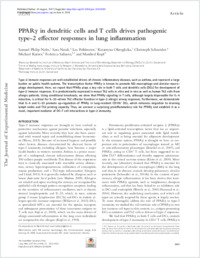PPARgamma in dendritic cells and T cells drives pathogenic type-2 effector responses in lung inflammation
- Nobs, Samuel Philip Molecular Biomedicine, Institute of Molecular Health Sciences, Department of Biology, ETH Zurich, Zurich, Switzerland
- Natali, Sara Institute for Research in Biomedicine (IRB), Faculty of Biomedical Sciences, Università della Svizzera italiana, Switzerland
- Pohlmeier, Lea Molecular Biomedicine, Institute of Molecular Health Sciences, Department of Biology, ETH Zurich, Zurich, Switzerland
- Okreglicka, Katarzyna Molecular Biomedicine, Institute of Molecular Health Sciences, Department of Biology, ETH Zurich, Zurich, Switzerland
- Schneider, Christoph Department of Medicine, University of California, San Francisco, San Francisco, CA
- Kurrer, Michael Pathology Institute, Zurich, Switzerland
- Sallusto, Federica Institute of Microbiology, Department of Biology, ETH Zurich, Zurich, Switzerland - Institute for Research in Biomedicine (IRB), Faculty of Biomedical Sciences, Università della Svizzera italiana, Switzerland
- Kopf, Manfred Molecular Biomedicine, Institute of Molecular Health Sciences, Department of Biology, ETH Zurich, Zurich, Switzerland
-
10.08.2017
Published in:
- Journal of experimental medicine. - 2017, vol. 214, no. 10, p. 3015-3035
English
Type-2 immune responses are well-established drivers of chronic inflammatory diseases, such as asthma, and represent a large burden on public health systems. The transcription factor PPARγ is known to promote M2-macrophage and alveolar macrophage development. Here, we report that PPARγ plays a key role in both T cells and dendritic cells (DCs) for development of type-2 immune responses. It is predominantly expressed in mouse Th2 cells in vitro and in vivo as well as human Th2 cells from allergic patients. Using conditional knockouts, we show that PPARγ signaling in T cells, although largely dispensable for IL-4 induction, is critical for IL-33–driven Th2 effector function in type-2 allergic airway responses. Furthermore, we demonstrate that IL-4 and IL-33 promote up-regulation of PPARγ in lung-resident CD11b+ DCs, which enhances migration to draining lymph nodes and Th2 priming capacity. Thus, we uncover a surprising proinflammatory role for PPARγ and establish it as a novel, important mediator of DC–T cell interactions in type-2 immunity.
- Language
-
- English
- Classification
- Medicine
- License
- Open access status
- hybrid
- Identifiers
-
- RERO DOC 324218
- DOI 10.1084/jem.20162069
- ARK ark:/12658/srd1318981
- Persistent URL
- https://n2t.net/ark:/12658/srd1318981
Statistics
Document views: 201
File downloads:
- Texte intégral: 250
